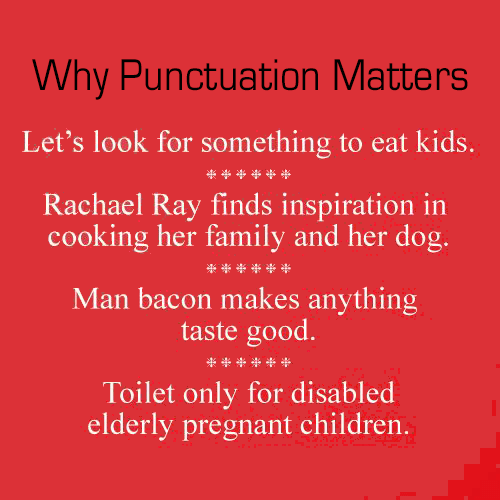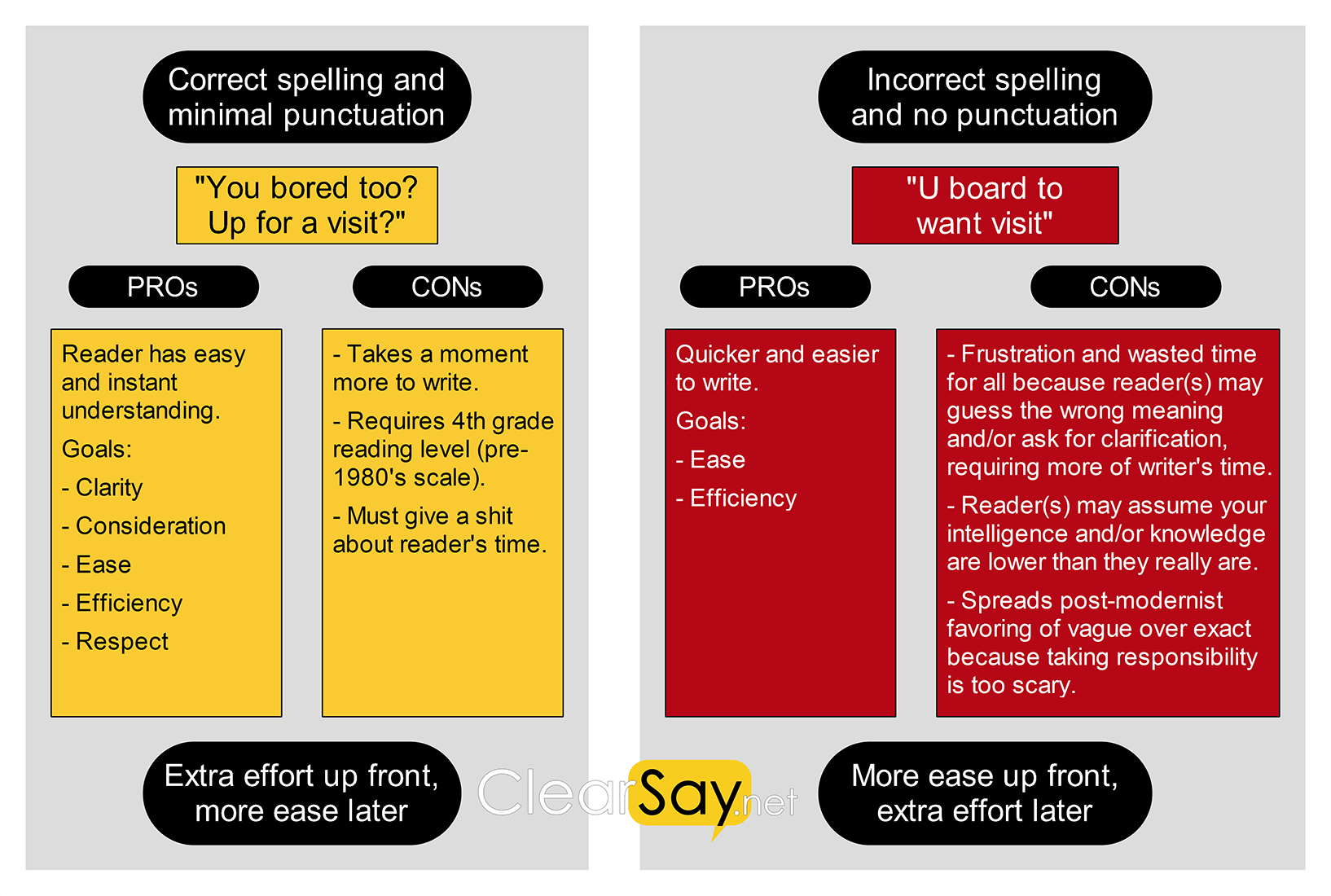Originally written in June 2022.
How much time do we actually save by taking short cuts with our communication?
I’m a fan of efficiency. This is why I simultaneously sympathize with and get frustrated by use of certain kinds of short hand in typed communication in an attempt at efficiency that at times ends up costing writer and reader more time than if the writer had taken a bit more time to add nouns, full words, commas, periods, and question marks.
Brief relevant detour
A scary trend: people are reading less or consider “reading” to be social media posts and audio books. We’re losing the brain exercise that comes from using imagination and pattern recognition to translate symbols into ideas. ALSO, exercise of focus and patience!
“But I have dyslexia, ADD, ADHD, ABCDEFG, LGBT…” or “It’s boring” or “I can’t focus that long on one thing” or “…”
Similar excuses could be applied to physical exercise and diet. And look around at how 44% of Americans are now – as of June 2022 – obese. That’s a different problem but I believe these two problems share some roots.
Back to the reduction in reading long form
It’s a vicious circle. I know many who make excuses like those above. Reading is hard for them for one reason or another, so they don’t do it, so it becomes even harder. Like any other skill or discipline, it takes some effort and repetition.
I see the results of this play out every day in many contexts. From friends, clients, and workers to various online debates and “professional” writers of articles having terrible grammar and/or lacking basic logic or knowledge.
It’s annoying when I have to ask someone to please clarify because they chose to use a special kind of shorthand that has mis-spelled words, no punctuation, and could have four different meanings. It wastes my time and theirs.
Reading increases empathy?
Why yes, it can! It can improve cognitive empathy. Especially character-driven narratives where the reader is privy to the thoughts of one or more characters. This “empathy exercising effect” can be more powerful when the character being read is of a different culture than the reader. I like to think that science fiction stories especially can provide and possibly amplify this effect.
When pronouns confound
When a person takes a bit of extra time to be clear with naming the nouns:
“Bob tasted his burger and the fries. Sam was also munching away happily. Frank took a bite of his burger and salad. Frank noticed Bob grimacing at the taste of the fries. Frank asked Bob what was up with his fries. Sam noticed and asked Frank what he meant. Bob answered, ‘My fries are cold.'”
When a person takes short cuts by using too many pronouns:
“Sam was munching away happily. Bob tasted his burger and the fries. Frank took a bite of his and some salad. He noticed him grimacing at the taste. He asked his pal what was up with that. He asked what he meant. He said his was cold.”
or
“Yeah let’s do that one. Out of the two, I like how it is more about the best way. He’ll like it, too. Better than the other one. And the other guy won’t think twice about using the other one, rather than the first one.”
In case my point is not clear when you read the two versions of the above narrative, I’ll say it: Use more names of things and people, even if it feels or sounds a little bit redundant. It can add quite a bit of clarity to what you are saying and save both of you time because the listener doesn’t have to ask for clarification or worse, keep their mouth shut and guess wrong at what you meant.
What’s the point of punctuation?

Some examples
“I care about our relationship. I want to talk in person. Can I come over? When is good for you?”
(Sender: 6 sec to type. Receiver: 2 sec to understand. Frustration level 0.)
vs
“I care about our relationship i want to talk in person can i come over when is good for you”
(Sender: 5 sec to type. Receiver: 5 sec to understand. Frustration level 2.)
vs
“I care about our relationship want to talk in person can come over when is good for you”
(Sender: 3 sec to type. Receiver: 7 sec to try to understand but realizes they can’t be sure of the exact meaning; like is Sender asking for meeting at who’s domicile? So spends 5 sec typing reply query. Original sender: 3 sec to read query for clarification, 4 sec to take deep breaths and decide to be either butt-hurt that their mind wasn’t read or to answer, chooses to answer, 4 sec to send clarification. Receiver: 3 sec to understand. Frustration level 9.5 for both parties.)
Oxford comma: Which side of the fence are you on?
Do you ever get frustrated by either receiving a message that is hard to understand or are you more often on the other side of the fence wishing people would lighten up about your way of conveying messages or just take the time to understand instead of pestering you for you to explain to them what is obvious to you?
Communication can unify or divide
What if the more variations (dialects) of English spoken in a given subculture, the less efficient communication is in aggregate? Maybe that is part of why I feel annoyance when people (increasingly) leave the “T” and “D” sound out of the middle or end of words. It’s called “T-glottalization.” Try saying the following words without the “T” or “D” sound or replace with an imaginary apostrophe:
butter (bu’er), bottle (bo’le), hospital (hospi’al), little (li’le), battle (ba’le), kettle (ke’le), cattle (ca’le), settle (se’le), rattle (ra’le), mutton (mu’on), beaten (bea’en), Britain (Bri’ain), satin (sa’in), Latin (La’in), mitten (mi’en), bitten (bi’en), gotten (go’en), cotton (co’on), forgotten (forgo’en), rotten (ro’en), eaten (ea’en), threaten (threa’en), sweeten (swee’en), fatten (fa’en), lighten (ligh’en), tighten (tigh’en), shorten (shor’en), straighten (straigh’en), flatten (fla’en), brighten (brigh’en)…
Reminds me of a “low class” British or Scottish accent or ebonics. In the interest of keeping this article from becoming a novel, that’s just one example. I wonder if you can think of some? I know; “Get off my lawn!”
Upspeak (Uptalk, Vocal Fry, Popcorning, Creaking)
Also, known as “High rising terminal.” Upspeak phrasing: When the last phrase in the sentence travels up or down in pitch. Popularized as “Valley Girl” in the 1980’s. It can be used to purposefully express a question or uncertainty, but that’s not what I take issue with.
When not done purposefully, it can convey that the speaker is not confident and/or seeking approval or agreement. It can come across as insecure or juvenile. Then there is when they come across as “spoiled, rich, arrogant, bored, and disinterested.”
Literally and like
“And there I was, literally floating an inch off the ground, so embarrassed!”
“He literally told me no! Like, what? Did he literally like say thaaaaat?”
“She was like, literally frustrated.”
“I literally laughed my ass off!”
Devil’s advocate
What if this morphing of language is merely more natural evolution toward more communication efficiency in aggregate and does not necessarily have intelligence, confidence, or political implications?
Arbitrarily plural?
One thing that bugs me about British English is their use of plural when referring to a singular entity that may be made up of individuals. It’s inconsistent with logic in so many ways I have a hard time ignoring it.
For example, American speakers refer to “Chevrolet” (the company) as singular as in “Chevrolet was rumored to be making a new type of car,” where Brits would say something like, “Chevrolet were rumored….”. In software coding it would be a nightmare to deal with.
Aren’t all entities groups of other entities, even going down to cellular or subatomic level? So either make everything plural (a real nightmare) or if a thing is a group then – to be efficient – you name that group and refer to it in the singular. Why is that so hard?
Ah the irony! I just re-read what I said above and check this out: “… about British English is their use of plural…” I wonder… Is this one of those numerous screwed up English exceptions where – since I didn’t explicitly name the group, it maintains plurality? Much as I love English, I do feel a bit sad (and admiration) for those who have learned it as their second language!!!
Finally. Have you heard?
Punctuation and correct spelling are now considered racist by a growing minority of loud voices.
– On Cussing / Cursing
– How Far Do You Extend the Definition of Force?
– Language that Dodges Choice & Responsibility












Recent Comments